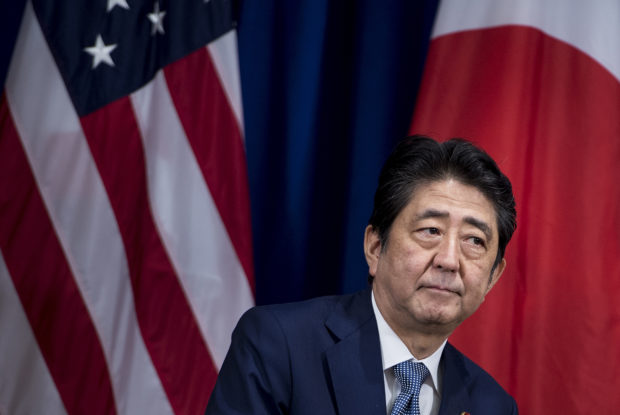Abe to keep up pressure on North Korea

Japan’s Prime Minister Shinzo Abe. AFP
Japanese Prime Minister Shinzo Abe, who officially began his third consecutive term Wednesday (Nov 1), said he believes North Korea is taking a “wait-and-see” approach amid a hiatus in its missile and nuclear tests.
But, with the verbal threats continuing unabated, Mr. Abe vowed to rally the global community to tighten the screws on Pyongyang until it “asks to come back to the negotiation table promising to change their policies”.
“All of its ballistic missile and nuclear development programmes must be abolished in an irreversible and verifiable manner,” Mr. Abe told a news conference last night, adding that history had shown the North to have “betrayed” Japan’s goodwill.
Mr. Abe, who is 63 and two years from becoming Japan’s longest-serving prime minister, was re-elected by lawmakers at a special Diet session yesterday. The session runs for 39 days, and the Prime Minister is expected to make a policy speech on Nov 17.
Yesterday, Mr. Abe reappointed his entire Cabinet, put in place in a reshuffle only three months ago, saying this was necessary for policy continuity.
Article continues after this advertisementThe developments come just before a seminal visit by United States President Donald Trump on Sunday (Nov 5), in which North Korea is expected to be top of the agenda.
Article continues after this advertisementOn Sept 15, North Korea fired a missile which flew over Hokkaido on its way into the Pacific Ocean. It was the second time a North Korean missile had flown over Japan in less than a month. The Japanese daily, Asahi, added to fears yesterday, reporting that radioactive material could reach Hokkaido if North Korea conducted a seventh nuclear test.
Mr. Abe yesterday said Japan was in lockstep with the US, its staunch ally, and that he agreed with Mr. Trump’s position that all options were on the table in dealing with the North. And he added that they had won the backing of many countries.
The harsh security climate was a key thrust of Mr. Abe’s ruling Liberal Democratic Party as it won big in a general election on Oct 22.
With coalition partner Komeito, the ruling bloc has a solid “super majority” in the Lower House with more than two-thirds of the 465 seats. It also controls over two-thirds of the Upper House, for which an election is not due until 2019.
Revising the Constitution, which Mr. Abe has said he wants to do, requires the support of at least two-thirds of both Chambers of the Diet, and a majority vote in a public referendum.
When asked if he intended to strike as the winds were in his favor and hold a referendum by 2019, the Prime Minister responded by saying that his priority was to “work together across all political stripes to have constructive discussions”.
He said his immediate priority was to compile a supplementary Budget for the fiscal year ending March next year, taking aim at Japan’s lengthy childcare waiting lists, and promised more support for small and medium-sized enterprises that are the core of Japan’s economy.
On top of that, a new policy package worth two trillion yen (S$23.8 billion, $17.5 billion) will be announced by early next month, Mr. Abe said, centred on productivity and human resource development as the “wheels of our vehicle as we confront low birth rates and an ageing population”.
He also took credit on the job front, saying efforts by the government and central bank had borne fruit. “We want to build a society where young people can create and build a good future with their own efforts,” he said.
When asked if he intended to reappoint current Bank of Japan governor Haruhiko Kuroda when his five-year term expires in April next year, Mr. Abe would only say: “It is still a completely blank slate.”